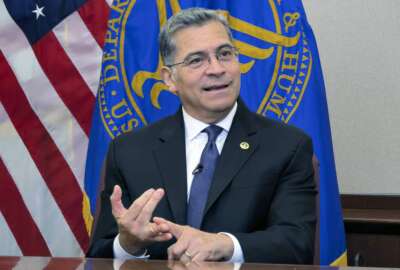Congress launches tip line for feds as it takes ‘worst’ agencies to task
Rep. Mark Meadows (R-N.C.), who oversees the House panel on government operations, says he wants to hear feds\' work-related concerns. He created the email hotline...
The head of the House panel that oversees federal workforce issues is inviting federal employees to share their work-related concerns through an email “tip line.”
The emails will be treated as anonymous resources for congressional investigations of workplace satisfaction at agencies. The information will help the House Oversight and Government Reform Subcommittee on Government Operations monitor agencies’ efforts to improve employee engagement and morale, according to the office of the subcommittee chairman, Rep. Mark Meadows (R-N.C.).
Meadows announced the tip line, TellMark@mail.house.gov, after concluding a hearing entitled, “The Worst Places to Work in the Federal Government.” The panel hauled in leaders of three low-ranking agencies — the Homeland Security Department, National Archives and Records Administration and the Chemical Safety Board — to testify about efforts to improve employee satisfaction.
The three agencies had received some of the lowest scores on the most recent Federal Employee Viewpoint Survey, which the government administers to all federal employees to discern their opinions about their work environments and leaders. The officials characterized their agencies’ ratings as problems that had grown over many years and would take months, if not years, to fix. Yet they assured members of the subcommittee that they were working on ways to boost their ratings in this year’s survey, which begins on April 28.
“I take the results of the Federal Employee Viewpoint Survey very seriously and personally,” said National Archivist David Ferriero, whose agency ranked 23rd out of 25 mid-sized agencies in the annual Best Places to Work in the Federal Government, which is based on the survey results.
“What is most distressing to me is that many staff feel that they’ve been undervalued and overworked for years,” said Ferriero, who has been in the position since 2009. “They are rightfully frustrated by the simple fact that over three decades, our holdings have tripled. Customer expectations have changed dramatically and electronic records require new resources while, at the same time, our workforce numbers have declined. We’re far behind finding efficiencies to do more with less. The very nature of our work has changed to the point where employees of 30 years ago wouldn’t recognize it.”
DHS’ morale problems also have been duly noted by the department’s leader, but he suggested that he was sick of hearing about them from outside sources.
“One of the ways that you improve morale is to stop continually telling my workforce that you have lousy morale,” Secretary Jeh Johnson said he told committee members in a meeting before the hearing began. He did not testify, although the agency’s chief human capital officer, Catherine Emerson, did.
The committee’s chairman, Rep. Mark Meadows, suggested he and the panel’s top Democrat, Rep. Gerry Connolly (D-Va.), would not follow Johnson’s advice.
“The ranking member and I believe that focusing on the great workforce we have is critical. We’ve agreed to go out and meet with the rank-and-file on a regular basis to hear from them,” he said. “There is at least one Democrat and one Republican willing to look at what matters most to the hundreds of thousands of federal workforce employees that serve our public every day.”
Yet recent congressional actions, from pay freezes to the 2013 government shutdown, coupled with the Republican majority’s fiscal 2016 budget proposals, would seem to contradict that sentiment, Connolly said.
“It’s not surprising that these events along with political attacks disparaging federal employees have had a toll on federal morale. Imagine,” he said. “The problem isn’t just within federal agency management. Part of the problem is the political management right here in the halls of Congress. We have to take responsibility for the impact we’re having on your workforce.”
If continued, the pattern would eventually impact how federal employees provide services to the public, he said.
GAO: Increasing employee engagement doesn’t cost a thing
It may be easy for agencies to blame a partisan Congress for employees’ discontent. Events like the government shutdown certainly don’t help. But agency managers would be wrong to think that Congress could solve employee-engagement problems, cautioned Robert Goldenkoff, a director on the Government Accountability Office’s strategic issues team.
“Even in challenging fiscal times, it’s a difficult but doable task,” he said, noting that most agencies had sustained or improved their scores on the employee viewpoint survey during the past few years of financial hardship.
While testifying as an expert, Goldenkoff noted that his agency consistently scores highly on the viewpoint survey. On the day after the shutdown, GAO’s head, Comptroller Gene Dodaro, stood outside the agency’s headquarters and welcomed employees back to work, Goldenkoff said.
“People are still talking about that to this day,” he said. “Sometimes it’s the things we learn in kindergarten that we forget about, like just saying, ‘Thank you.'”
Agencies with happier workforces share common strategies, he said. They pay attention to performance management, do things to create an environment that welcomes diversity and invest in employees’ career development, he said.
At the best and worst agencies alike, leaders believe that engaged employees will help the agency do a better job in fulfilling its mission, he said. The agencies that struggle do so at the nuts-and-bolts level, when they try to analyze the data to determine why their employees are unhappy.
“Agencies recognize they need to take action, but they have to focus on better implementation of the key steps,” he said.
At NARA, Ferriero has gone on a “listening tour” of agency facilities throughout the country so he can hear complaints directly from his 3,000 employees. The agency has adopted a six-part plan based on recommendations from the Partnership for Public Service and Deloitte, which compile the “Best Places” rankings. Those include things like partnering with labor unions and reinvesting in leadership training. It has also restarted its “Take Your Child to Work Day” in an effort to score a “quick win.” But it’s not clear that those efforts address the root causes of employees’ frustration.
NARA employees often do repetitive, physical work in windowless facilities, Ferriero said. Most workers are paid at the lower end of the General Schedule scale and have no clear opportunity for advancement or skills development. Yet nearly all of them love what they do and believe in the agency’s mission, Ferriero said.
The agency has launched an initiative to help employees chart career paths, in hopes that they’ll stay with NARA rather than seeing it as a springboard for jobs in records management elsewhere.
DHS has embarked on a similar campaign, which it calls the “Building-The-Department-You-Deserve” initiative, Emerson said. It has revived an awards program for employees that was dormant for six years. It is also making the hiring process more transparent, because employees have requested it. That includes posting notices in more prominent locations and training hiring managers, she said. In addition, the agency is focused on improving its Senior Executive Service corps, with which Johnson has met twice.
Committee members showed sympathy for Ferriero, who had invited Meadows to speak with employees at NARA, and Emerson. They did not give the same treatment to Manny Ehrlich, a new board member of the Chemical Safety Board, who volunteered to testify in place of the agency’s managing director, Daniel Horowitz, who was advised by agency lawyers to stay away.
The board has suffered from allegations of corruption and discord among its leaders. Recently, the White House removed the chairman, Rafael Moure- Eraso, leaving the agency without a permanent head. Rather than focus on those problems, Ehrlich attributed the low engagement scores among the agency’s 40 employees to budget constraints.
“Morale could be improved if one of two things happened: We need a chairperson confirmed and we need the ability to hire more investigators,” said Ehrlich. “We have only 20 to cover the entire country, based on our budget. As a result, we frequently must pull an investigator off of one investigation for a new one on an ad-hoc basis. This has caused more than a few morale problems.”
Nonetheless, he said, employees were productive and took pride in their work.
That was not the same as being satisfied, Meadows said.
“You’re here because the employees that work for you have given you an F consistently. We’re not going to put up with, ‘It’s not as bad as it seems,'” he said.
Meadows concluded the hearing by telling the agencies that he expected them to report back in a few months with evidence that they had increased employee engagement.
“I want to see progress,” he said. “I’m hopeful the three of you won’t be on this list next year.”
RELATED STORIES:
2014 Best Places to Work list reflects feds’ sagging morale
2014 Federal Employee Viewpoint Survey: Senior leaders get low marks
Johnson pitches DHS regional commanders as part of ‘unity’ campaign
Copyright © 2025 Federal News Network. All rights reserved. This website is not intended for users located within the European Economic Area.





